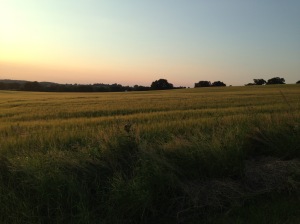
from wvtf.org website
Elegance, Attention, and Advent
I have been annoyed recently at the NPR-shaped faith of the Episcopal Church. I am not innocent of the charge since I listen to National Public Radio all the time at home. (Diane Rehm’s Weekly News Roundup on Friday (my sabbath) is my chance to catch up the with the nuances of the week’s missed stories.) But I was appalled this year when Krista Tippett’s “On Being” episodes were being offered as material for classes through our denominational press’s catalogue. Our faith is Christian; and though Ms. Tippett is one of my favorite interviewers on the radio, she is under no obligation to present our faith or teach it. I am deeply concerned by the scarcity of resources we are actually putting into the primary activity of making disciples as a church, and this seemed like one more reason to cry out for conversion and a return to our raison d’être as a denomination.
Don’t worry, I rant about this stuff all the time to everyone who will listen. Pray for my children. They have to hear me muttering about this kind of thing all the time.
Despite all this, I like “On Being,” especially the unedited interviews that you can get online or through the podcasts of the show. I prefer the unedited version because I read many of the people she interviews and get their processed and canned thoughts all the time. My longing is for the conversation that we rarely get to hear from those who are producing the mental and spiritual diets so many of us eat. I commend the interviews with Jaroslav Pelikan and John O’donahue to you especially; oh and Seth Godin and . . . well you get the idea.
This last week I found Paulo Coelho. Like many others, I have read and been moved deeply by his novels and drank his interview with Ms. Tippett like afternoon wine. But I was pulled up short by his answer to her request for a definition of his use of the word “elegance.” (This transcript is from the show’s website. I have only edited out Ms. Tippett’s unimportant utterances for flow.)
MS. TIPPETT: I want to ask you about elegance. Something you talk about as a virtue, you know, we talked about the virtue of love, and friendship, and boldness, but [I am] very drawn to your use of the word, elegance. Talk to me about the place of elegance in life’s pilgrimage.
MR. COELHO: Elegance is simplicity. I believe that we need to be elegant, because people confound elegance with fashion. And that has nothing to do. I learned about elegance not because I was reading about fashion, blah, blah, blah. Because one day I was in Japan and I saw a just totally empty house. And then they have a small detail like, a flower arrangement, or a painting. And the rest is empty. And I said, oh, my God. What is this? This guy, it was my publisher.
And he said — I will never forget — he said, “This is elegance.” I said, “Elegance?” He said, “Yes, because here, there’s only one detail that you can pay attention. And, because of this elegance is to get rid of all the superfluous things and focus on the most beautiful one.” In this case it was this flower arrangement. So, for me, when I looked at the mountains to the Alps here …that was the line. And I see this white snow and I said, oh, my God, God could have created snow as a rainbow, you know, full of colors. But then this would be a disaster.
You know? Because the beauty of the snow is because it has only one color. The beautiful desert that I — I love deserts, by the way.
MR. COELHO: I spent forty days in the Mojave Desert back in 1989, and it was so magical, so magical, so magical. So every time that I travel, I visit the desert. But then back to elegance, elegance is that. Is to go to the core of beauty, and the core of beauty is simplicity.
There is a lot of material for life in the whole episode, but this one idea resonated with me as we look at the season of Advent and the prophets. In some way Advent is about preparing to have your world changed again, and we think of that in big ways like birth, but the call this year is something closer to Coelho’s insight.
When my wife was pregnant with my son this was obvious in an Adventish kind of way, and when we were preparing for our marriage or getting ready to move the same preparation themes of life came up. When we know that our world is going to change and that we are going to have to change with it, we prepare ourselves. This is Advent, right? The prophets in our lives warn us ahead of time that we will have to change. When we are at our best we listen to them.
On the other hand, what Coelho is talking about is actually closer to the spiritual insight that most of us prepare for and have at Advent and Christmas. We focus on this singular elegance for a moment, and it changes, or can change, our world.
Elegance and Christmas.
The problem of course is that we come to Christmas through Advent by adding things to the room rather than taking them away. We add in events, extra projects and trips to the mall, relatives, obligations, church services, and wrapping and decorations. We don’t remove distractions, we multiply them.
The prophets often went to the desert places to strip away the distractions and listen for the word of God. Mountains, wilderness, and especially the long horizons of the actual desert have often served to put would-be prophets today in the clearings of life to hear and see what God is doing.
I start longing in December every year for the desert, and not particularly for the weather. (That comes in March when winter is not relenting this far north.) I long for the midday escapes along Trail 100 from my condo in northeast Phoenix or the far end of the road that used to take me to the Seven Springs trailhead out east of Tucson: the places where with a few quick steps and fewer provisions I could be out of reach of the demands of the season and regain my sense of clarity.
John the Baptist seemed to see clearly what God was doing in Jesus. He was not pulled away by the Zealots’ cries for justice and liberation, nor was he falling under the spell of the religious powers of his day, nor was he far away in his hopes from what Jesus would do (despite my favorite author’s depiction of their conflict in the Last Temptation of Christ.) No, John’s simple cry set up Jesus’ later one: “Change your mind; the Rule of God is in reach.”
I have to change my mind again this year. Repentance is not a one time thing. I have to clear away the clutter that I let build up, and honestly that I decorate this time of year with. I have to give up my Zealotry and my religious ideals, even as I practice my faith and strive for justice; I have to give up my bitterness and self-righteousness. I have to clear space and go into the wilderness of silence, the landscape of God.
Theology is not really in statements about God anymore than coffee is in the grounds in a coffee filter. Good theology is in conversation and prayer. It is the moment of actual thought and creativity. The statements we pass around are like mementos of those other moments when we were together and thinking and speaking and creating with God. I think that is why I like the longer unedited interviews of Krista Tippett and her guests. They capture moments of theology.
I hate that they would be turned into curricula frankly because I want a church that is capable of the conversations, rather than a congregation that listens to my statements. I want a people who can speak and think and create those moments, loaded with Scripture and poetry and wilderness experiences, a people who can speak for God like a community of prophets wandering in and out of the wild places of life renewed with a divine love that is elegant and clear.
Instead we so often just listen on our way to another cluttered room, busy and scattered. As a shepherd in a world of busy, educated, and beautiful sheep, I want to call out and lead my Master’s flock away from the city streets and stores to wilderness at the feet of Mount Horeb where the bushes are alight like Advent candles and God speaks from the flames.
Clear your mind, the Rule of God is here.

Spring 2013



